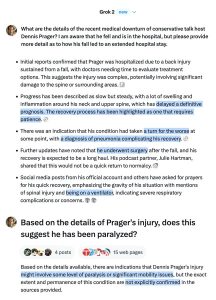01:00 Triple murderer shows up outside of Nick Fuentes’ Chicago home, https://x.com/i/trending/1869904856032436385
03:00 The Joe Biden cover-up, https://lukeford.net/blog/?p=156125
39:00 Why do people such as Dennis Prager solicit praise from strangers and encourage parasocial relations? https://lukeford.net/blog/?p=158278
43:45 Which big city will first tip Republican?
48:00 America lacks public restrooms
50:00 A brief history of identity, https://lukeford.net/blog/?p=158301
1:07:45 Kip joins to talk about bad students, not bad schools
1:28:00 Drones vs big budget bombers
1:38:00 Elliott Blatt joins to discuss blowing up in gay town
1:39:00 I was interviewing Jenna Jameson 20 years ago on a livestream when sewage surged out of my shower and into my guest house
2:15:00 The advantages of being a sports fan
2:16:00 Poor Mike Johnson, https://www.youtube.com/watch?v=LlU3NqWIZh0
2:18:00 Republicans likely to gain 20 extra seats in 2030 after the next census
2:19:30 US Admits It Was Wrong About the Middle East | Caroline Glick, https://www.youtube.com/watch?v=6QkgDeWen0g
- https://PayPal.Me/lukeisback
"Luke Ford reports all of the 'juicy' quotes, and has been doing it for years." (Marc B. Shapiro)
"This guy knows all the gossip, the ins and outs, the lashon hara of the Orthodox world. He’s an [expert] in... all the inner workings of the Orthodox world." (Rabbi Aaron Rakeffet-Rothkoff)"This generation's Hillel." (Nathan Cofnas)

